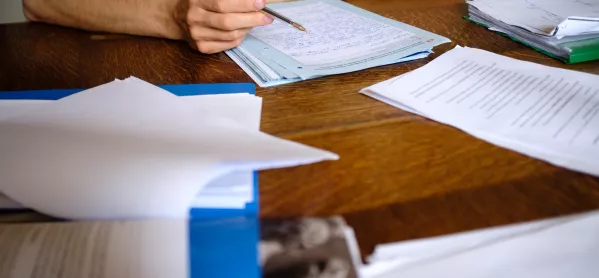- Home
- A-level results 2020: What to say to students
A-level results 2020: What to say to students

Results day is always a bit of a minefield, swapping back and forth between celebrating and offering students shoulders to cry on.
But this year throws new challenges our way - and greater challenges than we expected, thanks to last-minute changes to how A-level grades will be decided. And I thought that social distancing might be our biggest concern.
So how should teachers navigate this new normal, while maintaining the same support we always give our students who don’t get the grades they need? Here’s the guidance that I will be passing on to my staff.
A-level results day: Take it one step at a time
The admissions service Ucas will only speak with the student or their pre-approved person. Gone are the days when staff would phone on behalf of students to try and barter a deal - but that doesn’t mean we are obsolete. We can still be on hand to help guide the student to different courses once they are ready to start the clearing process. Before results day, it might be worth checking what your students applied for and refamiliarising yourself with courses that particularly align with your subject. Coming across confident about the HE courses available and generally what grades need to be achieved will help the conversations to go more smoothly.
It would also be helpful to familiarise yourself with how the appeals process and subject access requests will work this year, as schools can probably expect to be dealing with plenty of these.
Read more:
- Ucas: How will university admissions work this year?
- Guide to appealing A-level and GCSE results
- What is a subject access request?
A-level results 2020: On the day
Ucas Track will be available from 8am to students. So, although they won’t have their grades, they will be aware of which offers have been accepted, giving them a fairly good idea of what they have achieved. This means that some may be arriving at school (if indeed your students are collecting results in person) already emotionally charged.
It’s advisable for teachers to surround themselves with their team, so that colleagues will be there to support them if difficult conversations arise.
As a subject teacher, you don’t want to be embroiled in a long conversation with students or parents that makes you feel vulnerable. Remain concise and accurate in your answers, then pass the query on to your line manager if they still have concerns.
As well as reassuring students that everything will work out, here are some further pointers for you if you do encounter difficulty:
- Calmly reiterate that a broad range of evidence was considered to allow you to know your students well enough to give them their teacher assessment grade. Give them an idea of what factors you considered here.
- Explain that the grades the college submitted to the exam boards were agreed after an internal quality assurance process and are not the sole responsibility of you as their teacher.
- Point out that the grades submitted may not reflect what you gave, as the model by Ofqual is based on a wide range of statistics; for example, previous years’ attainment.
- There will be an option for some students to appeal their grade and replace it with the grade they achieved in their mocks. Students who achieved higher grades in their mocks will be able to appeal if they have “valid mock grades”, but we do not yet know what will constitute a “valid mock”. They will also have the option to sit the exam in the autumn if they are unhappy with the grades they secured in mock exams, or if they are dissatisfied with results awarded by exam boards.
- Recent advice from the Association of School and College Leaders states that rankings and centre-assessed grades are not exempt from a subject access request, but it’s strongly advised that you suggest this information will be given out at a later date, with a formal request from the student. This will allow for a cooling-off period and will enable subject teachers to discuss any requests with management.
Whatever your school or college is doing for results day, be comforted that we all did our best - we really did!
Rachael Hardcastle is assistant head of sixth form at Carmel College in Darlington
Keep reading for just £1 per month
You've reached your limit of free articles this month. Subscribe for £1 per month for three months and get:
- Unlimited access to all Tes magazine content
- Exclusive subscriber-only stories
- Award-winning email newsletters
